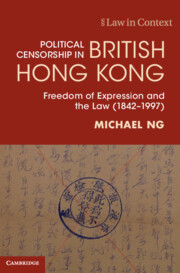Book contents
- Political Censorship in British Hong Kong
- Law in Context
- Political Censorship in British Hong Kong
- Copyright page
- Contents
- Figures
- Tables
- Acknowledgements
- Abbreviations
- Introduction
- 1 Punitive Censorship and Libel Lawsuits against the Press
- 2 ‘Reading Every Line’: Era of the Daily Vetting of Newspaper Proofs
- 3 ‘Communist China Now Contiguous to Hong Kong’: Censorship Imposed by the ‘Free World’
- 4 ‘Patriotism to You Can Be Revolutionary Heresy to Us’: Hardened Control of Media, Schools and Entertainment
- 5 Preparing to Negotiate with China: Overt Loosening and Covert Control
- 6 Liberating Hong Kong for China: De-silencing the City
- Conclusion and Epilogue
- Glossary of Chinese Newspapers
- Bibliography
- Index
4 - ‘Patriotism to You Can Be Revolutionary Heresy to Us’: Hardened Control of Media, Schools and Entertainment
Published online by Cambridge University Press: 21 July 2022
- Political Censorship in British Hong Kong
- Law in Context
- Political Censorship in British Hong Kong
- Copyright page
- Contents
- Figures
- Tables
- Acknowledgements
- Abbreviations
- Introduction
- 1 Punitive Censorship and Libel Lawsuits against the Press
- 2 ‘Reading Every Line’: Era of the Daily Vetting of Newspaper Proofs
- 3 ‘Communist China Now Contiguous to Hong Kong’: Censorship Imposed by the ‘Free World’
- 4 ‘Patriotism to You Can Be Revolutionary Heresy to Us’: Hardened Control of Media, Schools and Entertainment
- 5 Preparing to Negotiate with China: Overt Loosening and Covert Control
- 6 Liberating Hong Kong for China: De-silencing the City
- Conclusion and Epilogue
- Glossary of Chinese Newspapers
- Bibliography
- Index
Summary
Chapter 4 details the encroachment of the government’s silencing machine on Hong Kong citizens’ daily lives at the height of the Cold War. The period from the 1950s to the 1960s saw CCP cultural infiltration into various sectors of Hong Kong in an attempt to propagate anti-colonial patriotic ideas and communist ideologies. The CCP not only published, directly or indirectly, newspapers, books and magazines in Hong Kong, but also sponsored schools and film studios and staged theatrical performances. Together with the co-existence of KMT supporters and intelligence agents of other world powers in the colony, Hong Kong became an important ideological battleground of the Cold War in Asia. The colonial government responded by hardening its monitoring of newspapers and schools, suppressing them when necessary. It also monopolised the preparation of news bulletins for radio broadcasting and imposed political censorship on radio entertainment programmes, films and theatrical performances. Radical movements of the KMT and CCP also led to the two most violent riots in colonial Hong Kong history, in 1956 and 1967, respectively, in which a large number of political dissidents were deported, detained without trial and imprisoned for speech offences.
Keywords
- Type
- Chapter
- Information
- Political Censorship in British Hong KongFreedom of Expression and the Law (1842–1997), pp. 87 - 126Publisher: Cambridge University PressPrint publication year: 2022

